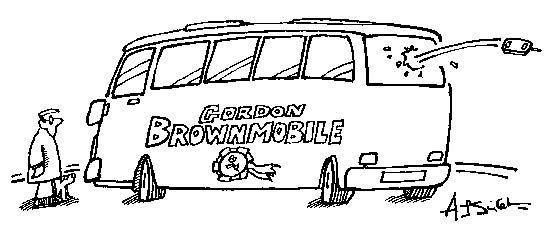Is this the glottal stop election? My husband shouts: ‘No’ a lo’ o’ bo’le’ at the television whenever Ed Balls or George Osborne come on.
Is this the glottal stop election? My husband shouts: ‘No’ a lo’ o’ bo’le’ at the television whenever Ed Balls or George Osborne come on. He calms down when Vince Cable starts speaking.
The glottal stop (plosive) is not lazy. The Cockney uses it instead of the t in Saturday, but it is quite hard to make that little obstruction of the throat in the right place. The sound is, however, still associated with rejection of the trappings of their upbringing.
The glottal stop has never served to distinguish between words in English. It replaces p, t or k in some accents, notably (for social observers) in Estuary English. Tynesiders cleverly insert it after a t, which no one else does.
Younger people do not realise how annoying glottal stops can be to those a generation older — such as me. Mr Balls asked of David Cameron: ‘Does he sound like people like us?’ The same might be asked of Mr Balls (aged 43). He was born in Norwich and went to a public school, Nottingham High, a member of the Headmasters’ Conference, then to Oxford. He uses glottal stops in words like Britain and in phrases such as like what or but at.
The use of glottal stops by Mr Osborne (38), if not so extensive as Mr Balls’s, seems more of a trahison des clercs. He is the son of a baronet, and went to St Paul’s school and then to Oxford. He uses glottal stops in phrases such as deficit and, create a, or turn that around.
Mr Cable (66, Yorkshire grammar school and Cambridge) scarcely uses such obtrusive glottal stops. In such phrases as separate that or that could, inter-consonantal glottal stops are not unusual in Received Pronunciation (RP). But when Mr Cable says heart of, the t shines out brightly.
Bright ts are not always welcome. RP speakers notice the Estuarine replacement of the t in bottle by a glottal stop. But they already use a different kind of t in bottle, a fricative variety not sounded sharply on the teeth. (Compare time and bit.) Nor is the l in bottle like the l in lean. In bottle it is a so-called dark l. So when someone uses a toothily bright t and clear l in bottle, the effect is infantile.
If other politicians, such as David Miliband, think glottal stops make them more acceptable to younger voters, note that Nick Clegg uses them like the avuncular Mr Cable. How big is the ‘stop the stop’ vote?






Comments